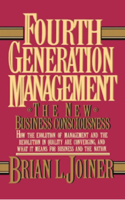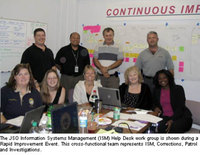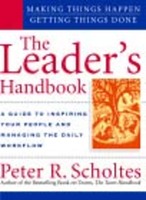Posts selected fromManagement Blog - Engineering Blog - Investing Blog and other blogs - Agile Software Development and Deming's Ideas
- Deming and Toyota
I believe Toyota applied Deming’s ideas to create a management system and continued to develop that system to create the Toyota Production System (also known as lean manufacturing). continue reading: Deming and Toyota - Lean Thinking and Management
I agree that we should acknowledge the paucity of success stories for improving the practice of management. The failures of management are not minor. The problems are large and the successes seem limited. The biggest thing I think we need to learn from this is that improving management is not easy. The concepts may seem simple but most of us can look around and see much more Dilbert Boss behavior than lean thinking behavior. And the gap between those two types of behavior seems to rise as you go “up” the organization chart. continue reading: Lean Thinking and Management - The Importance of Critical Thinking and Challenging Assumptions
 Critical thinking is important to applying management improvement methods effectively. It is important to know when decisions are based on evidence and when decisions are not based on evidence. It can be fine to base some decisions on principles that are not subject to rational criticism. But it is important to understand the thought process that is taken to make each decision. If we are not clear on the basis (evidence or opinion regardless of evidence) we cannot be as effective in targeting our efforts to evaluate the results and continually improve the processes in our organizations.
...
Changing the culture to one that values understanding and learning takes time. That process must be done with an understanding of psychology and the challenges of getting people to evaluate decisions. Creating a culture where it is expected that people think about the evidence and are comfortable explaining and defending the reasoning behind decisions is extremely important. continue reading: The Importance of Critical Thinking and Challenging Assumptions - Dangers of Forgetting the Proxy Nature of Data
 We use data to act as a proxy for some results of the system. Often people forget that the desired end result is not for the number to be improved but for the situation to be improved. We hope, if the measure improves the situation will have improved. But there are many reasons this may not be the case (one number improving at the expense of other parts of the system, the failure of the number to accurately serve as a proxy, distorting numbers, etc.).
I find something I learned from Brian Joiner an excellent summary – which I remember as:
Data (measuring a system) can be improved by
- distorting the system
- distorting the data or
- improving the system (which tends to be more difficult though likely what is desired)
Brian Joiner’s book, 4th Generation Management is a great book for managers.
continue reading: Dangers of Forgetting the Proxy Nature of Data - Management Improvement History
I do believe we need to improve our practice of Quality (and to do that we need to understand what happened in the past and why it was not more successful). The idea that Design of Experiments (DoE) was at the core of some Quality Movement to me is not at all accurate.
In my experience only a few Quality professionals today understand what it means and how it should be applied. The idea that it was common place in the 40’s I seriously doubt (though I don’t have first hand knowledge of this). I find it difficult to believe we would have decided to stop using DoE if it was commonly done previously. The understanding I have from those that should know (like George Box and previously my father – Bill Hunter) is that it was not at all common practice and still is not outside of a few industries and even there it is isolated in the domain of a few experts.I do have first hand knowledge of the 80’s and the idea that we did “employee training in problem solving, team activities and just-in-time inventory” well is not even close to accurate. We sent people to training on these things but other than JIT inventory the effectiveness of these efforts were poor (with a few exceptions that really did well).
“Quality” is not being practiced anywhere close to the level with which I am satisfied with in more than a few organizations. We have huge improvements to make in the practice of DoE, SPC, process improvement, having decisions made by the appropriate level (as close to the issue as possible), leadership, teamwork, data based decision making, the use of basically all the Quality tools, systems thinking, transformation… continue reading: Management Improvement History - Taguchi Loss Function
In practice, I have seen the concept of the Taguchi Loss Function used quite a bit. I have never actually seen any losses quantified and totaled and shown on a graph. I think focusing specifically on who suffers a loss and what that loss could be, can help. I think actually quantifying the losses to society can be daunting. So, while I see the value in framing the concept that way I think to actually get the losses quantified you are best served by starting with those closest to the process and then adding additional loses to those results.
Second, if you attempt to use the concept to help you manage (as a guide in decision making) the impacts to society are a factor, but, I think the loss to your company, the customer and perhaps the end user are most important. A negative impact to society at large is not going to have the same impact to a decision maker as the same negative impact to the customer. The decision maker will likely be willing to invest more to reduce the loss to a customer than to society at large (and that seems logical and sensible to me). continue reading: Taguchi Loss Function - Operational Excellence
Saying the organization is focuses on new principles (partnering, lean, etc.) is not the same as applying those principles with the great success that Toyota does. That difference is huge and is driving many companies to outsource and try to dramatically cut costs. Reducing costs should be the outcome of improving efficiency.
Toyota is successful manufacturing in the USA.
...
I would agree that many companies don’t understand the critical importance of management excellence. Rather than take the difficult path to lead real change in their organization they focus on simple cost cutting measures (though usually not cutting executive salaries which have grown dramatically and are excessive in the USA compared to the rest of the world). That won’t work. continue reading: Operational Excellence - Price Discrimination in the Internet Age
The argument that you need to cripple products by geographic area to cope with currency fluctuations is false. It might be that a company wants to practice Price Discrimination to charge more where they can get more and less where they can get less. In the view of such a company, the internet, and other factors, have made it increasingly easy for people to buy in the low cost region and resell the items in the region where the company wants to charge higher prices. If you want to keep practicing price descrimination as a company you have to erect barriers to the free trade of your products by your customers. continue reading: Price Discrimination in the Internet Age - Theory of Knowledge
 When managing many fail to predict when attempting to test improvement ideas through what should be experiments (often they are just changes without verification the change produced a desired effect, any learning or study of the results of the change). Without prediction learning is much less (if there is any at all) than it would be with such prediction.
...
With, even a fairly simple understanding of the theory of knowledge the effectiveness of management improvement efforts are greatly increased. This topic is difficult for most to understand, I recommend reading chapter four of the New Economics. continue reading: Theory of Knowledge - Control Charts in Health Care
The point of using a control chart, and many of the management improvement tools, are to improve the efficiency and effectiveness of resources spent improving. The trick is not really to improve (that is pretty easy) the trick is to improve quickly and effectively (and in a competitive marketplace to improve more quickly than competitors). Where improvement resources are targeted is critical. In deciding which improvement options to explore it is important to understand the impact on the outcome (in this case the health of the patient). continue reading: Control Charts in Health Care - Statistics for Experimenters – Second Edition
 Complete with applications covering the physical, engineering, biological, and social sciences, Statistics for Experimenters is designed for individuals who must use statistical approaches to conduct an experiment, but do not necessarily have formal training in statistics. Experimenters need only a basic understanding of mathematics to master all the statistical methods presented. This text is an essential reference for all researchers and is a highly recommended course book for undergraduate and graduate students.
This updates the classic text by George Box, William Hunter (my father) and Stu Hunter. continue reading: Statistics for Experimenters – Second Edition - Good Customer Service Example
I received my camera and I could not open the battery compartment: which was quite frustrating. I tried following the instructions but I couldn’t get it to open. So I tried calling Canon and I got a person on the phone within 30 seconds continue reading: Good Customer Service Example - Lean Management in Policing

Hiring of school crossing guards made more expedient. “This one’s amazing,” Sheriff Rutherford chuckles. “It was taking us 68 days to hire someone from our eligibility list because we were sending candidates all over for different parts of the interview process. Now it takes us just three days to make a decision because we’re practicing ‘one-stop hiring.'”
continue reading: Lean Management in Policing - Performance without Appraisal
 In the short article Performance Without Appraisal: What to do Instead of Performance Appraisals, Peter wrote:
Dr. Deming said of Performance Appraisals, “Stop doing them and things will get better.” He was correct. Many organizations, however, wonder what to do instead.
For those that do require “some alternative” Peter included some good ideas in The Leader’s Handbook(see chapter 9 “Performance without Appraisal pages 293 to 368). This chapter has excellent material for any manager. continue reading: Performance without Appraisal
|